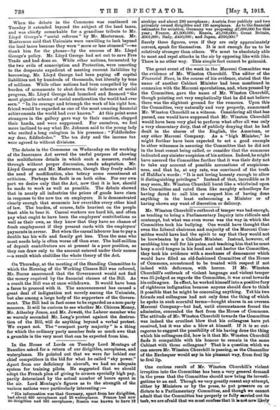Mr. Winston Churchill's outburst of temper was bad enough, as
tending to bring a Parliamentary Inquiry into ridicule and contempt, but what was even worse was the way in which the Committee took his bullying. One would have thought that even the Liberal chairman and majority of the Marconi Com- mittee would have had the spirit to say that they would not be browbeaten by a Cabinet Minister. Instead, however, of snubbing him well for his pains, and teaching him that he must keep a civil tongue in his head and not hector the Committee, they took his evidence with a meekness of demeanour which would have filled an old-fashioned Committee of the House of Commons, accustomed to be treated with respect if not indeed with deference, with horror. If Mr. Winston Churchill's outbreak of violent language and violent temper was ill-judged as regards the Committee, it was cruel towards his colleagues. In effect, he worked himself into a positive fury of righteous indignation because anyone should dare to think it possible that he might be concealing anything. Yet his two friends and colleagues had not only done the thing of which he spoke in such scornful terms—bought shares in an oversea Marconi Company—but had, until circumstances forced the admission, concealed the fact from the House of Commons. The attitude of Mr. Winston Churchill towards the Committee was indeed the cruellest blow that his colleagues have yet received, but it was also a blow at himself. If it is so out- rageous to suggest the possibility of his having done the thing which his colleagues did, how is it that Mr. Winston Churchill finds it compatible with his honour to remain in the same Cabinet with those colleagues ? That is a question which we can assure Mr. Winston Churchill is passing, as the Chancellor of the Exchequer would say in his pleasant way, from foul lip to foul lip.


















































 Previous page
Previous page